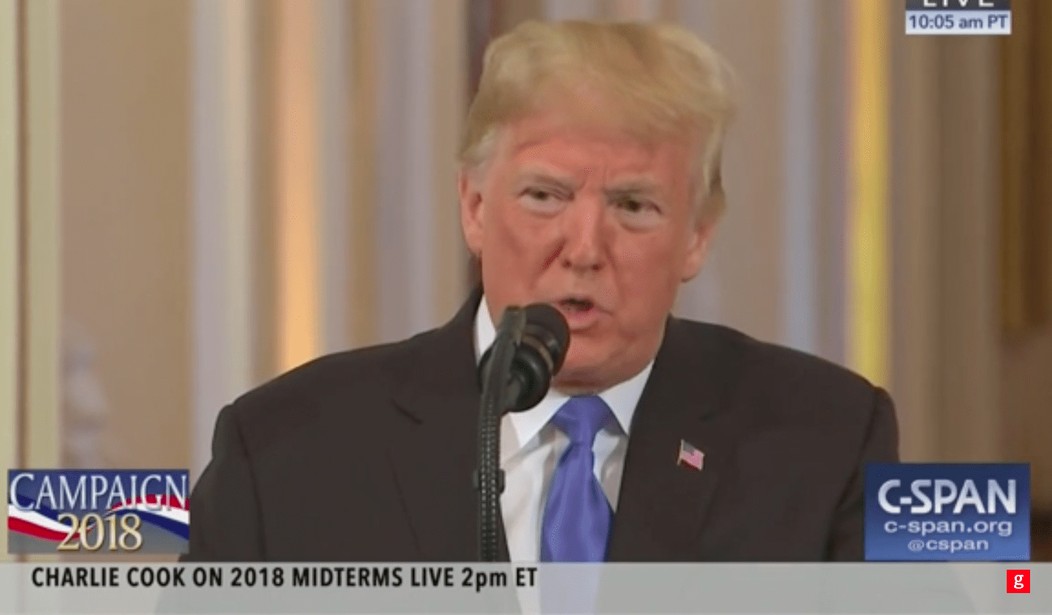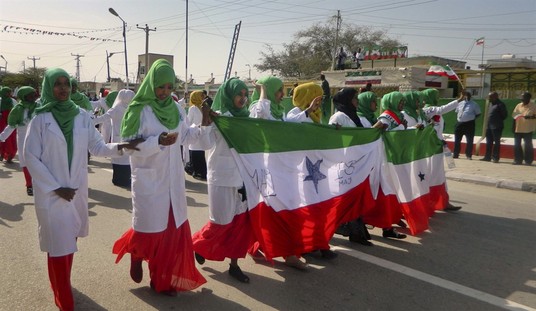During his press conference about the results of the 2018 midterm elections, President Donald Trump emphatically rejected the notion that his identity as a “nationalist” was really a dog whistle to white supremacists. He rightly pointed out that “nationalist” means a preference for one’s country and does not necessarily mean “white nationalist.” He also condemned racist terrorism in no uncertain terms.
“On the campaign trail, you called yourself a nationalist,” PBS News Hour’s Yamiche Alcindor began. “Some people saw that as emboldening white nationalists. Now people are…”
Trump interrupted her, saying, “Such a racist question.”
“There are some people that say that now the Republican Party is seen as supporting white nationalists because of your rhetoric, what do you make of that?” Alcindor finished.
“I don’t believe it,” Trump responded. “Why do I have my highest poll numbers ever with African-Americans? Why do I have among the highest poll numbers with African-Americans? I mean, why do I have my highest poll numbers…. That’s such a racist question.”
The president was referring to a Rasmussen Reports poll from August that revealed an astounding 36 percent of African-Americans approve of Trump. This is quite impressive, since only 8 percent of African-Americans voted for him in 2016. While Rasmussen is a Republican-leaning firm, even the National Association for the Advancement of Colored People (NAACP) found Trump’s approval at 21 percent.
No Republican presidential candidate has won more than 12 percent among African-Americans since Bob Dole in 1996, according to Cornell University’s Roper Center.
The president went on to explain what nationalist really means.
“I love our country, I do. You have nationalists, you have globalists,” Trump continued. “I also love the world. And I don’t mind helping the world, but we have to straighten out our country first.”
In this moment, plain as day, Trump defined two terms in opposition to each other — “nationalist,” meaning someone who prioritizes their nation or country; and “globalist,” meaning someone who prioritizes the world.
Contrary to Left-wing smear outlets like the Southern Poverty Law Center (SPLC), these terms don’t have racist implications in the way that Trump uses them. The SPLC has — laughably — suggested that Trump’s attacks on “globalists” reveal him as an anti-Semite, intentionally echoing the anti-Semitic fears of “globalist” Jews. While anti-Semites have used that language, Trump has been a wonderful president for the state of Israel, and he has welcomed his daughter Ivanka’s conversion to Orthodox Judaism, and happily promoted his Orthodox Jewish son-in-law, Jared Kushner.
Liberals constantly strain to read racism into Trump’s comments, when there is no racism there. The president opposes efforts to unite the world under one government and economy (this may be negative in its trade implications). He supports efforts to prioritize America’s needs first. Whatever Americans think of this platform, it is not racist.
The president concluded saying, “But to say that, what you said, is so insulting to me. It’s a very terrible thing that you said.”
Indeed, the redefinition of basic words into white supremacist and anti-Semitic dog whistles is a “very terrible thing.” When liberals twist Trump’s words to make them racist, they are widening the chasm of America’s political tribalism. They are literally making it impossible for people to understand what Trump is really saying.
The president is far from perfect, and many of his comments have been very insensitive. Democrats and liberals could focus on what the president has actually said, and the offensiveness of what he has actually meant, rather than making up false “dog whistles” to paint him as a secret white supremacist.
Instead, they engage in what amounts to a conspiracy theory — that Trump uses terms like “nationalist” to enflame America’s secret hordes of white supremacists.
Furthermore, the president himself explicitly condemned white supremacist “hate.”
When asked, “Do you believe that white supremacist terrorists, right-wing terrorists, these home-grown terrorists on that side of the spectrum, are a problem?” the president unequivocally said yes.
“I do believe that,” Trump declared. “I believe all hate is a problem. But I do believe that is a problem and it’s a problem we want to solve.”
When the reporter asked about funds dedicated to fighting that kind of terrorism — funds Trump has reportedly shifted to fighting radical Islamic terrorism — Trump insisted that his administration is dedicating “a lot of funding” to the problem.
For emphasis, he later added, “It’s a problem that I don’t like even a little bit.”
As for Trump’s response to Alcindor’s “racist” question, it seemed needlessly aggressive. Unfortunately, many liberals are twisting Trump’s words to mean what they do not mean, and the president should have the chance to set the record straight. While Alcindor may have been using the platform to spread a liberal conspiracy theory, she at least gave Trump the opportunity to respond to it.
Trump, proud of the Jews in his family, is not an anti-Semite. Trump, who condemned right-wing terrorism in no uncertain terms, is not a supporter of white supremacists. His use of the terms “nationalist” and “globalist” is not a dog whistle, and liberals need to stop intentionally twisting his words.
Watch Alcindor’s question below.
Follow the author of this article on Twitter at @Tyler2ONeil.
Trump’s remarks on terrorism.









Join the conversation as a VIP Member